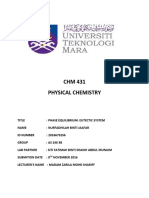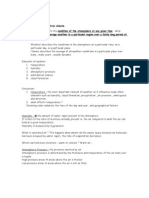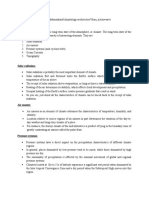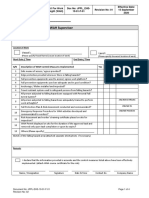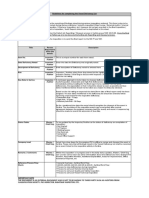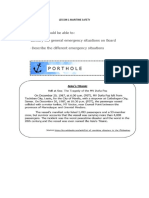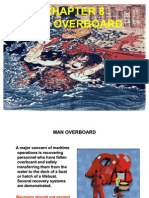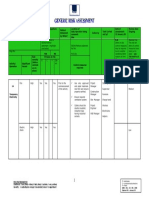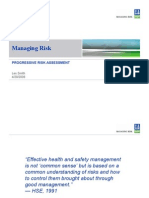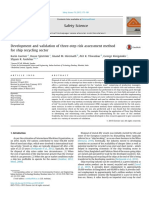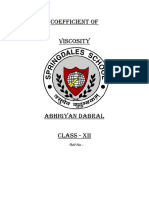100%(1)100% found this document useful (1 vote)
172 viewsWeather Study Guide
Weather Study Guide
Uploaded by
api-283300042A meteorologist is someone who studies weather and measures various conditions using instruments like a barometer, anemometer, rain gauge, and thermometer. A barometer measures air pressure, an anemometer measures wind speed, a rain gauge measures precipitation, and a thermometer measures air temperature. The document provides detailed descriptions and explanations of different types of clouds, weather phenomena like precipitation, fronts, and various storms.
Copyright:
© All Rights Reserved
Available Formats
Download as PDF, TXT or read online from Scribd
Weather Study Guide
Weather Study Guide
Uploaded by
api-283300042100%(1)100% found this document useful (1 vote)
172 views3 pagesA meteorologist is someone who studies weather and measures various conditions using instruments like a barometer, anemometer, rain gauge, and thermometer. A barometer measures air pressure, an anemometer measures wind speed, a rain gauge measures precipitation, and a thermometer measures air temperature. The document provides detailed descriptions and explanations of different types of clouds, weather phenomena like precipitation, fronts, and various storms.
Original Title
weather study guide
Copyright
© © All Rights Reserved
Available Formats
PDF, TXT or read online from Scribd
Share this document
Did you find this document useful?
Is this content inappropriate?
A meteorologist is someone who studies weather and measures various conditions using instruments like a barometer, anemometer, rain gauge, and thermometer. A barometer measures air pressure, an anemometer measures wind speed, a rain gauge measures precipitation, and a thermometer measures air temperature. The document provides detailed descriptions and explanations of different types of clouds, weather phenomena like precipitation, fronts, and various storms.
Copyright:
© All Rights Reserved
Available Formats
Download as PDF, TXT or read online from Scribd
Download as pdf or txt
100%(1)100% found this document useful (1 vote)
172 views3 pagesWeather Study Guide
Weather Study Guide
Uploaded by
api-283300042A meteorologist is someone who studies weather and measures various conditions using instruments like a barometer, anemometer, rain gauge, and thermometer. A barometer measures air pressure, an anemometer measures wind speed, a rain gauge measures precipitation, and a thermometer measures air temperature. The document provides detailed descriptions and explanations of different types of clouds, weather phenomena like precipitation, fronts, and various storms.
Copyright:
© All Rights Reserved
Available Formats
Download as PDF, TXT or read online from Scribd
Download as pdf or txt
You are on page 1of 3
Weather Study Guide
Sol 4.6
What type of weather is associated with a high
pressure air mass?
The measure of the amount of heat energy in the
atmosphere. A thermometer is used to measure
air temperature.
The weight of the air. It is determined by many
factors including the temperature of the air. A
barometer is used to measure air pressure.
Changes in air pressure allow us to predict
changing weather patterns.
High pressure air masses usually bring dry,
clear conditions.
What type of weather is associated with a low
pressure air mass?
Low pressure air masses usually bring clouds,
rain, and wind.
What is a front?
A front is a boundary between air masses of
different temperature and humidity.
How is a cold front formed?
A cold front is formed when a cold air mass
pushes into a warm air mass. This heavy cold air
sinks and creates a high pressure area. A cold
front will often produce thunderstorms, followed
by dry, clear conditions.
How is a warm front formed?
A warm front is formed when a warm air mass
pushes into a cold air mass. As the warm air
rises, a low pressure area is created. A warm
front will sometimes produce light rain.
Describe cirrus clouds and tell what weather
conditions are associated with them?
Cirrus clouds are feathery, look like wisps of
hair high in the sky, and are made from tiny ice
crystals. They are associated with fair weather.
Cirrus clouds often indicate that rain or snow will
fall in several hours.
Describe stratus clouds and tell what weather
conditions are associated with them?
Stratus clouds are smooth, gray clouds that
cover the whole sky (like a blanket),blocking out
direct sunlight. Light rain and drizzle are usually
associated with stratus clouds. Fog is a created
when stratus clouds are low to the Earth.
Describe cumulus clouds and tell what weather
conditions are associated with them?
Cumulus clouds are fluffy and white with flat
bottoms and look like big cotton balls in the sky.
They usually indicate fair weather.
What is temperature?
What is air pressure?
Describe cumulo-nimbus clouds and tell what
weather conditions are associated with them?
What is precipitation?
How is rain formed?
How is snow formed?
How is sleet formed?
How is hail formed?
Cumulo-nimbus clouds are formed by cumulus
clouds that join together. They become so full of
moisture, they turn dark and heavy, often
resulting in thunderstorms with heavy rains,
thunder, and lightning.
Precipitation is any form of water that falls from
the atmosphere to Earths surface. Precipitation
is measured with a rain gauge. Precipitation
includes rain, snow, sleet, and hail.
Water vapor in the atmosphere condenses,
changing from gas to liquid. These liquid water
droplets become too heavy and fall to the ground.
Snow is formed when the water droplets in the
clouds freeze high in the atmosphere, forming ice
crystals. These ice crystals attach to each other
and become heavier. When they weigh too
much, they fall to the ground as snow.
Sleet is formed when ice crystals fall, but the air
temperature is just above freezing, so some of
the ice crystals melt and some remain frozen.
Hail is formed when raindrops are frozen into
crystals in a storm cloud. Winds produced by the
storm cause the frozen ice crystals to repeatedly
rise and fall, melting and freezing again. This
causes layers of ice to form around the original
ice crystal. When it becomes very heavy, it falls
as a ball of ice.
How are hurricanes formed and what type of
weather is associated with them?
Hurricanes are formed when small
thunderstorms over the ocean grow larger as
they take in more and more heat and moisture
from the warm ocean water. They have strong
winds that move in huge circles. Hurricanes are
the largest storms on Earth!
How are tornadoes formed and what type of
weather is associated with them?
Tornadoes are formed during thunderstorms as
a column of warm air begins to spin upward
forming a funnel cloud. A tornado is MUCH
SMALLER than a hurricane. Tornadoes have
extremely strong circular winds and can be the
most violent type of storm.
What is a meteorologist?
A meteorologist is a person who gathers data
about weather using a variety of instruments.
What does a barometer measure?
air pressure
wind speed
What does an anemometer measure?
precipitation
What does a rain gauge measure?
temperature of the air
What does a thermometer measure?
You might also like
- Tolerances According To en 10162 Standards: Outside DimensionsDocument1 pageTolerances According To en 10162 Standards: Outside DimensionsJuan Carlos PlataNo ratings yet
- Exp 6 Phase Equilibrium Eutectic SystemDocument6 pagesExp 6 Phase Equilibrium Eutectic SystemNur Fadhilah33% (3)
- Fire Department Meeting Agenda TemplateDocument1 pageFire Department Meeting Agenda Templatekarim awadNo ratings yet
- 1st Year Weather and ClimateDocument3 pages1st Year Weather and ClimateBrYan GoNo ratings yet
- Elements of ClimateDocument2 pagesElements of Climatevidh VRNo ratings yet
- HHG QuotationDocument2 pagesHHG QuotationRajiv Ranjan100% (1)
- Fire Fighting and Prevention Works - Approved List of Materials SL. NO. Material Description ManufacturerDocument2 pagesFire Fighting and Prevention Works - Approved List of Materials SL. NO. Material Description ManufacturerSIVANo ratings yet
- Ho 89Document1 pageHo 89Shanmugam AnnamalaiNo ratings yet
- Tips For Weather ReportDocument15 pagesTips For Weather Reportsyed Muntazir naqviNo ratings yet
- Comparison Auditor OHSAS 18001 IRCA SMK3Document5 pagesComparison Auditor OHSAS 18001 IRCA SMK3Ricky ARIEF100% (1)
- 09-2020 Health Performance IndexDocument4 pages09-2020 Health Performance IndexBabay JamNo ratings yet
- Model Manual For General Cargo Container Vessel Tcm4 75127Document72 pagesModel Manual For General Cargo Container Vessel Tcm4 75127diegocely700615No ratings yet
- Emcy Resp PlanDocument40 pagesEmcy Resp PlanredchaozNo ratings yet
- Cloud Assignment PDFDocument13 pagesCloud Assignment PDFhudabdullah95No ratings yet
- Basic Elements of A Successful Safety and Health Program: Frank Dobson, CHSTDocument46 pagesBasic Elements of A Successful Safety and Health Program: Frank Dobson, CHSTRoslanNo ratings yet
- Deck Crane Greasing Aug. WORKING ALOFT MayDocument3 pagesDeck Crane Greasing Aug. WORKING ALOFT MayKevin KrisdiantoNo ratings yet
- RA Templates - Painting&blasting PDFDocument27 pagesRA Templates - Painting&blasting PDFV_SanthanakrishnanNo ratings yet
- Work at Heights PermitDocument4 pagesWork at Heights PermitFerdinand M. TurbanosNo ratings yet
- SRC Berth RegulationsDocument33 pagesSRC Berth Regulationsmae_blurNo ratings yet
- The Resource For OSH Professionals: American Society of Safety EngineersDocument4 pagesThe Resource For OSH Professionals: American Society of Safety EngineersGabrielNo ratings yet
- SMSM CH 07 06 Environmental Procedures CH 07.06Document26 pagesSMSM CH 07 06 Environmental Procedures CH 07.06joreyvilNo ratings yet
- STAN 10.01.05!02!10.01.05-02 Vessel Deficiency List Rev.4 - Remote Internal Audit..Document7 pagesSTAN 10.01.05!02!10.01.05-02 Vessel Deficiency List Rev.4 - Remote Internal Audit..Cris Dela CruzNo ratings yet
- Lesson 1 Emergency SituationsDocument9 pagesLesson 1 Emergency SituationsFACIArnold Sean l QuiaoNo ratings yet
- Manoeuver BoardDocument37 pagesManoeuver BoardPraveen DevNo ratings yet
- CDP 3001 - Guidance Ship Security PlanDocument43 pagesCDP 3001 - Guidance Ship Security PlanLiviu LiviuNo ratings yet
- 14 Temporary ElectricityDocument1 page14 Temporary ElectricityIdada EzekielNo ratings yet
- 10 Important Things To Do During Ship Collision AccidentDocument14 pages10 Important Things To Do During Ship Collision AccidentE BarajasNo ratings yet
- DNV - Examination and Test of Launching Appliances and On-Load Release GearDocument9 pagesDNV - Examination and Test of Launching Appliances and On-Load Release GearCleverson SchmidtNo ratings yet
- Preparations For Stability CalculationDocument11 pagesPreparations For Stability CalculationvalentkuenNo ratings yet
- Progressive Risk AssessmentDocument26 pagesProgressive Risk Assessmentapi-3733731No ratings yet
- Man OverboardDocument2 pagesMan OverboardIlija BaldicNo ratings yet
- Group 10 Accident Investigation UpdatedDocument6 pagesGroup 10 Accident Investigation UpdatedAikovin ClerigoNo ratings yet
- How Is The Atmosphere Structured?Document6 pagesHow Is The Atmosphere Structured?Rebecca PaceNo ratings yet
- Kick - Off Meeting - Revanta Vendor Name - Prism Johnson Limited - RMC India Division Scope of Work - Supply of Ready Mix ConcreteDocument28 pagesKick - Off Meeting - Revanta Vendor Name - Prism Johnson Limited - RMC India Division Scope of Work - Supply of Ready Mix ConcreteSahim Dandoti100% (1)
- Slips, Trips and Falls SlogansDocument7 pagesSlips, Trips and Falls Slogansthomas alphoNo ratings yet
- NMS CKL 01, Ship FamiliarizationDocument1 pageNMS CKL 01, Ship FamiliarizationSOHAG BISWASNo ratings yet
- Interpretation Solas 2005 PDFDocument280 pagesInterpretation Solas 2005 PDFChristian Rodrigo Gonzalez Cockbaine100% (1)
- Risk, ReliabilityDocument20 pagesRisk, ReliabilityJinn100% (1)
- Record of Topics CoveredDocument4 pagesRecord of Topics Coveredsamar jeetNo ratings yet
- 26599Document6 pages26599Jason LeoNo ratings yet
- H-05 2017 Hot Work Windlass WinchesDocument4 pagesH-05 2017 Hot Work Windlass WinchesGamalMahranNo ratings yet
- Tropical Meteorology AllDocument96 pagesTropical Meteorology AllSajjad Husham SalihNo ratings yet
- Adjuntar A TRB #1Document62 pagesAdjuntar A TRB #1mateoNo ratings yet
- Working AloftDocument4 pagesWorking AloftMelkisedek KamagieNo ratings yet
- Development and Validation of Three Step Risk Assessment Method For Ship Recycling Sector 2015 Safety ScienceDocument15 pagesDevelopment and Validation of Three Step Risk Assessment Method For Ship Recycling Sector 2015 Safety ScienceEvi SiswantoNo ratings yet
- 01 PDFDocument4 pages01 PDFanon_322442463No ratings yet
- Mod 5 Unit 30 International Safety Management CodeDocument12 pagesMod 5 Unit 30 International Safety Management CodeMc LiviuNo ratings yet
- Terminal SafetyDocument40 pagesTerminal SafetyPort0% (1)
- PPA Monthly OHS Report FormDocument1 pagePPA Monthly OHS Report Formalmamunmolla96No ratings yet
- Intro To Safety ManagementDocument2 pagesIntro To Safety ManagementFatima CellonaNo ratings yet
- Pollution PortDocument49 pagesPollution PortCorto MalteseNo ratings yet
- Accident Prevention RegulationsDocument519 pagesAccident Prevention RegulationsSeamen 777No ratings yet
- Qualitas Golden Rules of SafetyDocument1 pageQualitas Golden Rules of SafetyQualitas RemosNo ratings yet
- Safe Handling of Chemicals (Shoc) Card - WinskoDocument36 pagesSafe Handling of Chemicals (Shoc) Card - WinskoBen AdaborNo ratings yet
- JPI Master's ChecklistDocument6 pagesJPI Master's ChecklistmcdaleNo ratings yet
- StowawayDocument7 pagesStowawayCostisNo ratings yet
- Man Overboard: Group #5 Bm2 Jomel O San Agustin PN Bm2 Nixon S Diloy PN Rd2 Ronelo S Gatacilo PNDocument29 pagesMan Overboard: Group #5 Bm2 Jomel O San Agustin PN Bm2 Nixon S Diloy PN Rd2 Ronelo S Gatacilo PNJomel San AgustinNo ratings yet
- MSDS Sodium HypochloriteDocument9 pagesMSDS Sodium Hypochlorited8201006No ratings yet
- Jasraj - Exercises For Sertica TrainingDocument4 pagesJasraj - Exercises For Sertica TrainingjasrajNo ratings yet
- Workshop Technology 1: Accident PreventionDocument24 pagesWorkshop Technology 1: Accident PreventionMohsen SaidiNo ratings yet
- clouds and precipitationDocument45 pagesclouds and precipitationchaudhryshafaqnawazNo ratings yet
- Ass 02Document3 pagesAss 02Adi SoNo ratings yet
- Site AnalysisDocument39 pagesSite AnalysisCorellia RachelNo ratings yet
- Seminario 1Document5 pagesSeminario 1Javier FrancoNo ratings yet
- Acheson Die Spraying Device DAG 1000 MCT Manual 1 of 4Document58 pagesAcheson Die Spraying Device DAG 1000 MCT Manual 1 of 4İsmail Süleyman ŞentürkNo ratings yet
- PUT Paper of Manufacturing Science II (2019-20)Document3 pagesPUT Paper of Manufacturing Science II (2019-20)Tulsi ChouhanNo ratings yet
- A-2 Dipole in Front of A Cube: Keywords: Dipole, PEC, Metal, Lossy, DielectricDocument4 pagesA-2 Dipole in Front of A Cube: Keywords: Dipole, PEC, Metal, Lossy, Dielectricoasv926No ratings yet
- 4 PinkrovaDocument9 pages4 PinkrovaNik AsriNo ratings yet
- The Structure of MatterDocument5 pagesThe Structure of MatterHugh BlythNo ratings yet
- GH1248, GH1250, GH1253 Preliminary Datasheet V3.0 2Document8 pagesGH1248, GH1250, GH1253 Preliminary Datasheet V3.0 2NEXTECH ElectroicsNo ratings yet
- 14 Year 13 Chemistry Paper 2 QP ABDocument13 pages14 Year 13 Chemistry Paper 2 QP ABlaukkeasNo ratings yet
- CIRCUITS 1 - Lab Experiment #05Document2 pagesCIRCUITS 1 - Lab Experiment #05jeryl generalaoNo ratings yet
- Least Learned Skills With Test Questoinnaire 3 Quarter: Sta. Elena Elementary SchoolDocument3 pagesLeast Learned Skills With Test Questoinnaire 3 Quarter: Sta. Elena Elementary SchoolLinrose Go ReynaNo ratings yet
- Assignment 02 Class Ix MotionDocument2 pagesAssignment 02 Class Ix MotionRahul KumarNo ratings yet
- 19ME0319-Heat & Mass TransferDocument5 pages19ME0319-Heat & Mass TransferMad BoyNo ratings yet
- KathirDocument4 pagesKathirPratheepa KuruNo ratings yet
- What Is Bioclimatic ArchitectureDocument6 pagesWhat Is Bioclimatic ArchitectureSandeep NarayananNo ratings yet
- Astm D6913 D6913M 17Document11 pagesAstm D6913 D6913M 17rsoasadigmoniem2023No ratings yet
- Engineering Softwares Used in The Food Engineering EducationDocument13 pagesEngineering Softwares Used in The Food Engineering Educationlhphong021191No ratings yet
- Detecting Insect Flight Sounds in The Field: Implications For Acoustical Counting of MosquitoesDocument8 pagesDetecting Insect Flight Sounds in The Field: Implications For Acoustical Counting of MosquitoesAnonymous FGzNDzIeJNo ratings yet
- The Project For Human Resource Development Scholarship by Japanese Grant Aid (JDS) Basic Mathematics Aptitude Test 2017Document7 pagesThe Project For Human Resource Development Scholarship by Japanese Grant Aid (JDS) Basic Mathematics Aptitude Test 2017PPP CenterNo ratings yet
- Coring Application and Technology PDFDocument19 pagesCoring Application and Technology PDFlucian_lov100% (2)
- Electrostatics With SolutionDocument23 pagesElectrostatics With SolutionmanojNo ratings yet
- Mo OculusDocument119 pagesMo Oculusenugraha01No ratings yet
- SMA 1216 Course OutlineDocument2 pagesSMA 1216 Course OutlinecharlesNo ratings yet
- Intermolecular Forces: Polarity of Molecules: Seventh Course (General Chemistry) by Dr. IstadiDocument23 pagesIntermolecular Forces: Polarity of Molecules: Seventh Course (General Chemistry) by Dr. IstadiBINTANGNo ratings yet
- Uniform Plane WaveDocument57 pagesUniform Plane WavePuneeth SiddappaNo ratings yet
- Coefficient of ViscosityDocument16 pagesCoefficient of ViscosityDaksh ChoudharyNo ratings yet
- Electromagnetic Tool Changer For ABB IRB1200 by Chandrashekhar ChudmungeDocument5 pagesElectromagnetic Tool Changer For ABB IRB1200 by Chandrashekhar ChudmungeChandrashekhar ChudmungeNo ratings yet
- 598Document6 pages598Muhammed SulfeekNo ratings yet

